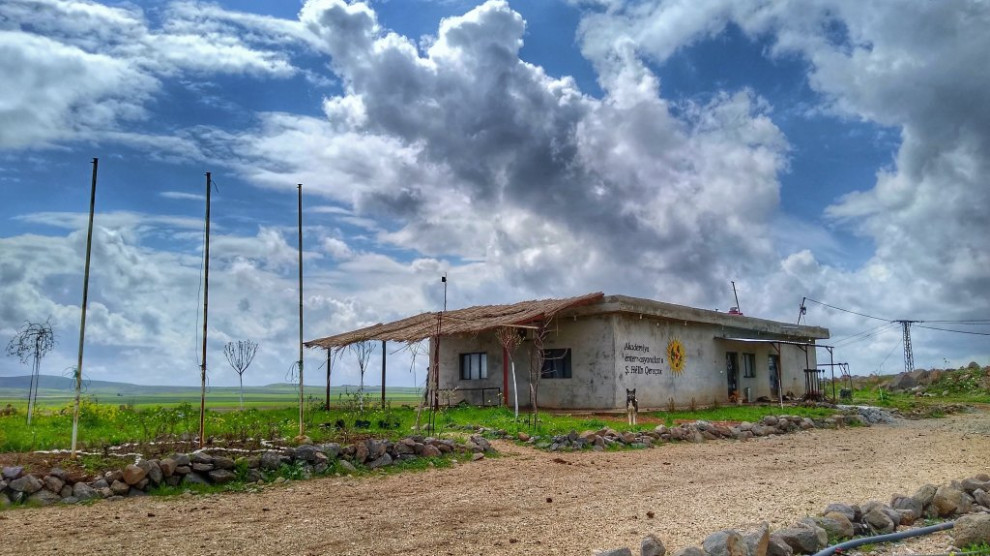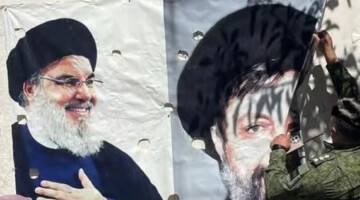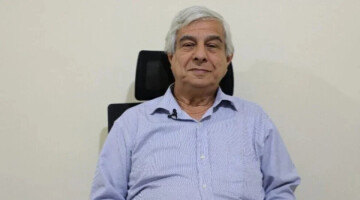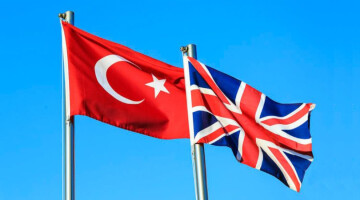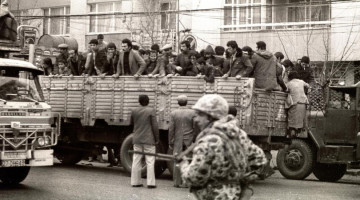The editorial team of Komun-Academy interviewed the Internationalist Commune of Rojava. As a political space for internationalist youth to take part in the revolution in Rojava, the commune was established in the summer of 2017. The Internationalist Commune is running the internationalist academy Şehîd Hêlîn Qereçox (named after the British internationalist YPJ fighter Anna Campbell, who fell in the defense of Afrin against the Turkish invasion in 2018). The academy offers education about the ideological basis of the Kurdistan Revolution as well as the history of internationalism, to discuss perspectives for Global Democratic Confederalism.
Everyone is curious about life at the Internationalist Commune of Rojava! Many people outside Rojava visit your website and read about your efforts and perspectives on different platforms. Could you tell us more about how you organize your lives? What does it mean to be a commune?
To be a commune means a lot of things at the same time. On the one hand we are a place for internationalist youth to take part in the revolution in Rojava. At the same time there is also the internationalist academy to understand the ideological foundations of this revolution. We also educate comrades about the history of internationalism, so that everyone has the possibility to develop an understanding, of what internationalism could mean today.
Sometimes, to be part of the Commune also means that we actually stay together in the place of the Internationalist Commune and organize our lives in a communalist way. We do sports together or organize small seminars on topics that are relevant for a project or our understanding of the revolution. For example, the last seminar we held together was about Orientalism. The comrades also have the possibility to take part in all the other revolutionary works that are happening in Rojava, like society work or work in institutions or structures. In society works, our comrades organize the youth or implement plans like communal activities. Several initiatives have been formed from within the framework of the commune, for example the ecological works of the Make Rojava Green Again campaign.
In general, we can say that the kind of internationalism that is today put into practice in Rojava has many aspects and is relevant to every level of defense of the revolution. Our comrades come from many places. Lately, a lot of comrades from Catalan countries, Switzerland, England and Germany joined our works.
What is the role of education in your life at the commune? Do you learn new things in Rojava? Where do you obtain new knowledge from?
Education is a continuous part of revolution. We open our academy to give ideological education to newly arrived friends, but also continuously. In times of practical work, everyone is reading, discussing and trying to develop. Education can also be to visit institutions or to have ideological discussion with someone from the society. Also, trying to put projects into practice is something that educates us a lot. We get to know ourselves: Why was I not able to do a tree planting project in a successful way?
Especially new arrivals learn a lot of things in a short time. Learning Kurdish is also something very important, that especially new friends give a lot of their time to, because it is also the base for doing everything else.
Most of our knowledge on a practical level comes from the society or from comrades staying here for a longer time, because it is necessary to understand the mentality and the organization in Rojava to put something into practice.
We continuously develop our thoughts, because under the conditions of war and embargo, we also have to know how to make something last.
To what extent does communal living shape your consciousness? Do you feel differences between your life at the commune and political work you have done in your home countries in this regard?
Communal living makes you think differently, because it is the base of thinking and planning socially, instead of only for yourself. You start to stop thinking so much on an individual level: “Is this good for me?“ turns into the question: “Will this bring progress?“ Living in capitalist modernity, we often got into conflicts, because we were for a big part pursuing egoistic motives. We thought that we will be happier if we have our own room, our house, our car and our personal time table. But this is not the case, at the end it makes humans lonely. In communal life, you are almost never alone, not in an ideological or emotional sense, nor in a physical sense. All of your struggles and contradictions, even the days when the house is too cold – everything is also lived by your comrades. Maybe there was some unity, some sense of communality in our lives in Europe, if we struggled. But the stronger the struggle of Rojava, the more a growth in communality. Important is also the question of how well we ourselves manage to change our personalities and find our place in the struggle. Nothing in our life here stays in the abstract, all our contradictions or problems are right there in your life, and like this you learn to struggle and develop with yourself and others.
Members of the commune, especially the women, have published excellent work on the struggle against patriarchy. Are there particular autonomous efforts of women at the commune?
The commune is a place where we try to put the ideology of the Kurdish women’s movement and of Abdullah Öcalan into a practice that is meaningful for us as internationalist young women. In this sense we can also say that we have always seen the necessity to also have autonomous programs, education days, the possibility to work for some time in the works of the women’s movement or to join Jineloji educations. We have seen a great need to develop ourselves, to be able to develop a militant personality in the struggle for women’s freedom. On the other hand we have to say that Turkey’s attempts to destroy Rojava and the aim of other states such as Russia and US to suffocate it and rob it of its meaning have a profound effect on the situation of women in Rojava. Thus, our works somehow changed after the last offensive. Now we can say that for example the comrades in society works take a meaningful role in organizing young women, but also getting the opportunity to more deeply understand the liberation of women and at the same time oneself. We take part in the works of the Young Women’s Union of Rojava and it is also possible for comrades to take part in the works of Kongreya Star, the general women movement in Rojava. Both young women and women’s organizations take part in organizing the society and solving problems of the women in Rojava, just with a different focus according to the role young women and women take in the society.
You have recently started the campaign “Make Rojava Green Again“ and the book you have written about this work has recently been published. Can you share with us you’re understanding of ecology, including its social implications?
We understand ecology as something that cannot be achieved without also overcoming the statist system and the hierarchical, patriarchal society. In patriarchy, nature is seen as something below humans to use without any limits. But we see a need to overcome this for humans’ and nature’s sake. It is necessary to see nature as something alive, and that needs a society without oppression to flourish. We need to strengthen the ability of the society to democratize and create itself, to then also be able to develop economy in a long-lasting and local frame, when it comes to the basic needs of people.
Ecological catastrophe is of course a global problem that affects all life on our planet. At the same time, statist forms of socialism/liberation struggles with their high modernist and industrialist frameworks have often neglected this issue, to say the least. It seems significant that you decided to work on ecology as internationalists. Theoretically and practically, what is the relationship between ecological struggles and the nature of revolution?
We see nowadays the horrifying war being waged on the revolution in Rojava. This war has also great ecological implications, it stops our ability to step forward in the development of a new, ecological economic system. It destroys the society and its ability to progress on a basis of building a local ecological food system. So we can say that states do not only neglect this issue, but aim to destroy this revolution and the solution it could offer to the ecological problems. In this sense we can also see that more and more struggling ecologists in Europe are taking interest in the revolution in North-East Syria. It is not only us who decided that we are going to work on ecology, but it is a big search for change, that we can in general now see in the society all over the world.
In the recent past, especially the women’s liberation movement in Kurdistan has expressed the need to move beyond solidarity in favor of building concrete, joint struggles for global liberation and democracy. Do you agree with this perspective? If so, how do you assess the role of the Internationalist Commune of Rojava in articulating internationalism in the 21st century?
We agree with the struggle for a global women’s liberation and struggle for democracy, especially as the women’s movement is now developing this perspective further towards an initiative for a global perspective in the framework of democratic confederalism. We aim for all our comrades to play their role in building this. If we want to be successful in making the 21st century the century of the women, as Abdullah Öcalan said, we as internationalist young women will also have to step forward. In all of our works we can ask ourselves, how we are actually working towards achieving this on a practical level. We can see that the Internationalist Academy will take its part in this process by offering education. At the same time, especially for the comrades from Europe, it is important to overcome individualization, because the societies of Europe have been strongly damaged by the statist and capitalist system, and like this, the free woman is also being forced to surrender to the system. In this sense, we think it is important to work on our attitudes towards forming a society, to put free women back into a place at the heart of the society.
How has the Turkish invasion (first Afrin, later “Peace Spring”) affected your work at the commune?
In general, in Rojava during the time of the invasion, but also until now, our aim is to organize everything to bring progress the ability of the revolution to defend itself. In this, the internationalists from the Commune play an important role on two levels: On the one hand they are defending the values of internationalism, as do internationalists of the Middle East.
On the other hand, the internationalists from the Commune took a meaningful impact on a practical level, by taking part in media work, health work, campaign work, societal work and work in the frame of the general mobilization. In all of these areas there is a great improvement in creativity and understanding, when people from all over the world take part.
We also have to say that the invasion makes some of our work impossible. Some ecological projects on the ground for example cannot be continued under these conditions, because more resources are needed for the defense, and it is not possible to put a focus on anything besides this, if the situation is difficult.
What are concrete ways in which internationalists outside Rojava can help defend the revolution?
We hope that more and more people will understand the revolution in Rojava as their revolution. Like this, we also think it is necessary that it is not understood as something apart from everything else. We can say that after the last attacks the evaluation was made that two subjects where a major part of the defense of the revolution: The forces on the ground in Rojava and the actions that were happening on an international level. Like this, also the concrete works of internationalists outside of Europe have to have a lot of colors: There will be direct solidarity work necessary, but also works on a lot of other levels. Diplomatic work, solidarity work, educational work, but also building Apoist organization all over the world. May it be in pushing for a deeper understanding over Jineoloji works or over revolutionary youth organization. The better we understand Abdullah Öcalan’s perspectives, the more we will also find the spirit and creativity to reach progress on all levels of the revolution. And each one of these friends of the movement, every organization will then also ask themselves about what part they can take in the defense of the revolution. This is what we want to advise the most to everybody: to always keep in movement, to keep on struggling and put all of our heart and creativity in it, ao that we will achieve the greatest progress no matter the obstacles. And as our comrades always say: The first rule in war is to always keep in movement and to be fast. This is also true for every work outside Rojava in times of war. We have to be prepared for every possibility, also the heaviest war.
Any more comments/calls you wish to make?
We hope that our comrades find their place in this revolution in Rojava or the struggle for it in all the other places of the world, as we hope that this revolution will be an important step in overcoming patriarchy and capitalism.

